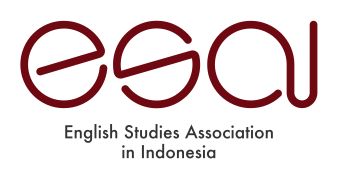Hedging in News Stories and Editorials in The Jakarta Post and The Washington Times
Abstract
The use of hedges in academic discourse is important because academic writers need to present their findings and arguments accurately but carefully so that they are academically appropriate. Many researches have been conducted on this topic; however, not many studies have explored the use of hedges in other discourses such as newspaper discourse. Newspapers contain different types of articles with different linguistic characteristics. These different characteristics may include the different uses of hedges. The use of hedges in newspapers is no less important as their use in academic discourse, as newspapers serve as an important source of information. This research is an attempt to find out the frequency and the different types of hedges used in two newspapers, i.e. The Jakarta Post and The Washington Times newspaper. The types of articles that are used as the object of study are news stories and editorials. This study also compares the use of hedges in the two types of articles from both newspapers. The findings show that hedges are used more frequently in editorials compared to news stories in both newspapers. However, the Indonesian writers tend to use hedges more frequently compared to the American writers, especially in news stories.
Keywords: hedges, news stories, editorials
Full Text:
PDFReferences
Abdollahzadeh, 2011.Hedging in Postgraduate Student Theses: A Cross-Cultural Corpus Study. International Conference on Languages, Literature and Linguistics IPEDR vol.26, 581-586.
Atai, M. and Sadr L. 2006. A Cross-Cultural Genre Study on Hedging Devices in Discussion Section of Applied linguistics Research Articles. PAAL Japan Proceedings, 11, 42-57.
Fraser, B. 2010. Pragmatic Competence: The Case of Hedging. In Kaltenbock, G. et al (eds.). New Approaches to Hedging, 15-34. Emerald Group Publishing Limited.
Hyland, K. 2000. Hedges, Boosters and Lexical Invisibility: Noticing Modifiers in Academic Texts. Language Awareness vol.9, no.4, 179-197.
Lakoff, G. 1973. A Study in Meaning Criteria and the Logic of Fuzzy Concepts.Journal of Philosophical Logic vol.2, no.4, 458-508.
Nivales, M.L.M. 2011.Hedging in College Research Papers: Implications for Language Instruction.Asian EFL Journal vol.52, 35-45.
Richards, J.C. et al. 2002.Longman Dictionary of Language Teaching and Applied Linguistics. London: Pearson Education Limited.
Santrauka. 2008. Hedging in Newspaper Discourse. 11-15. . [9/7/2012]
DOI: http://dx.doi.org/10.30813/jelc.v4i1.289
Refbacks
- There are currently no refbacks.



2.jpg)



